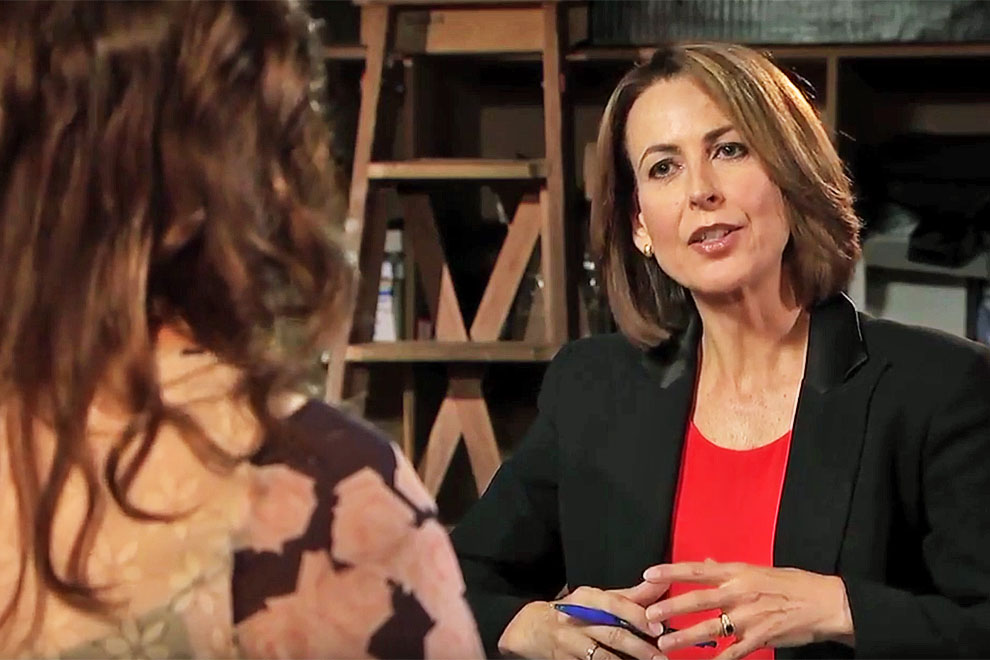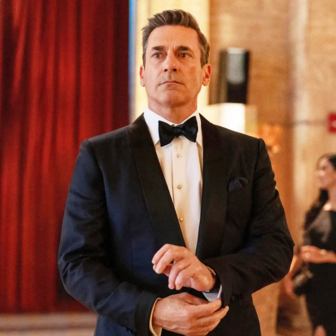As the controversy surrounding actress Kristin Davis’s appearance on Seven’s Sunrise continued to play out last week, a rift opened up in current affairs television. A new skirmish in the ancient high-culture/low-culture wars crackled through the airwaves.
Davis, best known to viewers as Charlotte in Sex and the City, was in Australia as an ambassador of the UN High Commissioner for Refugees. She answered a range of questions about refugees and her work for the UNHCR before being inveigled into a wince-making impromptu sketch in which she was asked to play her former TV role while presenter Samantha Armytage and other members of the Sunrise team acted out a scene from Sex and the City. Davis attempted to caution them – “I don’t know that this is a great idea, frankly” – but there’s no stopping a cosplay enthusiast, and she was obliged to go through with it.
Davis made her feelings known afterwards on Twitter, and Armytage was dropped as host of the UNHCR lunch. Awkward apologies were made to camera on Sunrise the next morning, but it didn’t end there.
“What the hell is wrong with those daft women on commercial breakfast TV?” demanded Virginia Haussegger in the Fairfax papers. “Why are they winding up the ditzy dial?” She accused the Sunrise team, headed by David Koch, of subjecting Davis’s UNHCR agenda to “blithe dismissal.” Armytage hit back the following day. “To use petty barbs such as ‘bimbo,’ ‘dumb,’ ‘ditzy,’ ‘daft’ to prove a point,” she wrote, “does not make you a feminist. It makes you a bully.”
If Haussegger’s attack was somewhat overpitched, this may have been a sign of personal pique. As she stated in her article, she had herself interviewed Davis for the ABC the day before, engaging in a much more probing and detailed discussion of the worldwide refugee crisis and the importance of Australia’s contribution to UNHCR programs.
It’s a very good interview, and is available online. Davis comes across extremely well – warm and spontaneous, a vital speaker with an agile sense of diplomacy. Australia is making a huge impact through its commitment to refugees, she says, referring in particular to Australian programs supporting women in conflict zones, and livelihood building in parts of Africa. Haussegger gets in immediately with questions about the other side of our national personality, which has emerged in response to refugees approaching our shores, but Davis wants to keep out of the politics and revert to the global picture. There are sixty million displaced people worldwide, she says. “By not allowing the refugees to come to our countries, we’re making matters worse – we’re keeping them on the outside, we’re keeping them disenfranchised.”
On ABC’s Media Watch, Paul Barry wondered why Haussegger’s interview was only released online. Was it because the UNHCR wanted to give commercial TV the free-to-air exclusive? “And now they feel aggrieved that they didn’t get what they expected. Well, tough luck.” Barry’s astringent style always risks making him sound like a headmaster delivering a dressing down at the school assembly. But maybe he and Haussegger are justified in claiming the high ground. Certainly the Haussegger interview with Davis is a cut (well, several cuts) above the discussion on Sunrise, during which Armytage contributed such remarks as “I love that you use your celebrity for good.”
If this is a matter of populist versus quality TV, what is really at stake? Current affairs television traverses a spectrum from committed analytical and investigative reporting to a kind of adult Play School: fun time in the studio to help you chill out about the state of the world. It’s all too easy to poke a stick at tabloid TV, but as the US primaries are currently demonstrating, populism is the way to cut through, and there’s nothing like xenophobia for cutting. National boundary maintenance has become the fiercest political psychodrama of our times, and if Trump has his way, the United States will soon have its own version of the Berlin wall.
Boundary maintenance in Australia is all about the coastline, and I doubt many of Barry’s viewers – or Haussegger’s – are promoters of #stoptheboats. If refugee advocates want greater influence over the public response to the refugee crisis, there’s no point in just preaching to the converted. Davis’s value as an ambassador for the UNHCR is precisely that she can engage audiences across the cultural and political spectrum. When she makes viewers laugh in friendly familiarity as she responds to chitchat about whether Sex and the City’s Carrie should ever have got married, and can carry some of this sympathetic familiarity across to images of refugee women in the Congo, she may actually be reaching through to the side of human nature that leads to wall building.
“It’s in everyone’s best interest to take care of those who find themselves in dire, dire circumstances,” Davis said in response to a question from David Koch about the widespread fear of tides of refugees moving across the world. “We should not be afraid of them, we should be afraid for them.” To get that statement out there on Brekky Central could have much greater impact than via ABC’s 7.30.
I wish, though, that Davis had been part of the panel on Q&A the following Monday, when Mark Steyn, billed as “conservative commentator and writer,” responded to a question about offshore detention with this statement: “I think the great population migrations that are under way are a terrible thing and I would like the evil of human trafficking to cease and it is the case around the world that many people are essentially economic refugees and it would be better for the world if their countries were to be made more habitable.”
What if this string of assertions were pitted directly against the statement Davis made on Sunrise? Would it have amounted to anything more than a he-said/she-said wrangle of the kind that is par for the course on Q&A? Actually, yes. Davis knows what she’s talking about. She’s been there, in among people from some of the most devastated communities around the globe.
My immediate response to Steyn was, where are the fact checkers? Q&A now starts with host Tony Jones inviting viewers to request fact checks on anything the panellists say that may be based on erroneous assumptions. But fact checks on refugee questions are a can of worms. After several hours trawling the net for substantiating facts on so-called economic migrants, my head was spinning.
Bob Carr made a similar claim in 2013, when he was Labor foreign minister. The majority of people seeking asylum in Australia, he asserted on Lateline, were “economic migrants,” yet in subsequent interviews, he was unable to provide substantiating evidence. The ABC’s own fact check revealed a complex and uncertain picture. Since Australia had stopped processing new boat arrivals twelve months previously, there was no recent data to go on. In the twelve months prior to that, 71 per cent of those arriving by boat were found to be refugees, which would indicate that Carr was fundamentally wrong. There is an ongoing debate about whether or not some of those from Sri Lanka who were sent back under Carr’s directive were fleeing persecution. Who would be in a position to know?
That’s the problem. On Monday this week, Guardian political reporter Katharine Murphy let rip in her commentary on an exchange in parliamentary question time about the Baby Asha case:
We journalists can’t keep the public properly informed because the government won’t allow us to do that, and the government then blames us for failing to be accurate. It’s a disgrace, and the absurdity of fictions, the absurdity of the policy contortions, the deeply irritating false binaries and false equivalences in this debate, are obviously unsustainable to anyone who looks at this area for more than five minutes.
It’s a nice idea that a neat set of statistics will sort out all the bickering. But when facts splinter into sets of numbers and graphs, each of which can be read differently in accordance with varying contextual information and interpreted according to different frameworks of preconception, they’re nothing but fuel for more bickering. Certainly we need facts and information, but above all we need eyewitness reportage.
And in the increasingly dangerous international debate over refugees, we also need principles. Of course, there’s a caution here too. Trump’s supporters think he’s got principles. So did John Howard’s. He trumpeted them right through the children overboard affair, just as Turnbull government ministers are trumpeting their principles when they talk about breaking the people smugglers’ evil business model.
All of this makes me think of the scene from Peter Bogdanovich’s 1973 film Paper Moon, in which the con man who has made his little daughter Addie his partner in crime protests that there are some things he won’t do. “I got principles,” he says. To which Addie (played by nine-year-old Tatum O’Neal) retorts that she doesn’t know what they are, “but if you got ’em, you can sure bet they belong to somebody else.”
Those who can speak with genuine moral authority are a different breed, and the authority should come from experience and firsthand knowledge. Davis brought some of this. Her visit here was all too brief, but if the Australian media hadn’t made a complete hash of it, it would have been an opportunity to cut through. •




